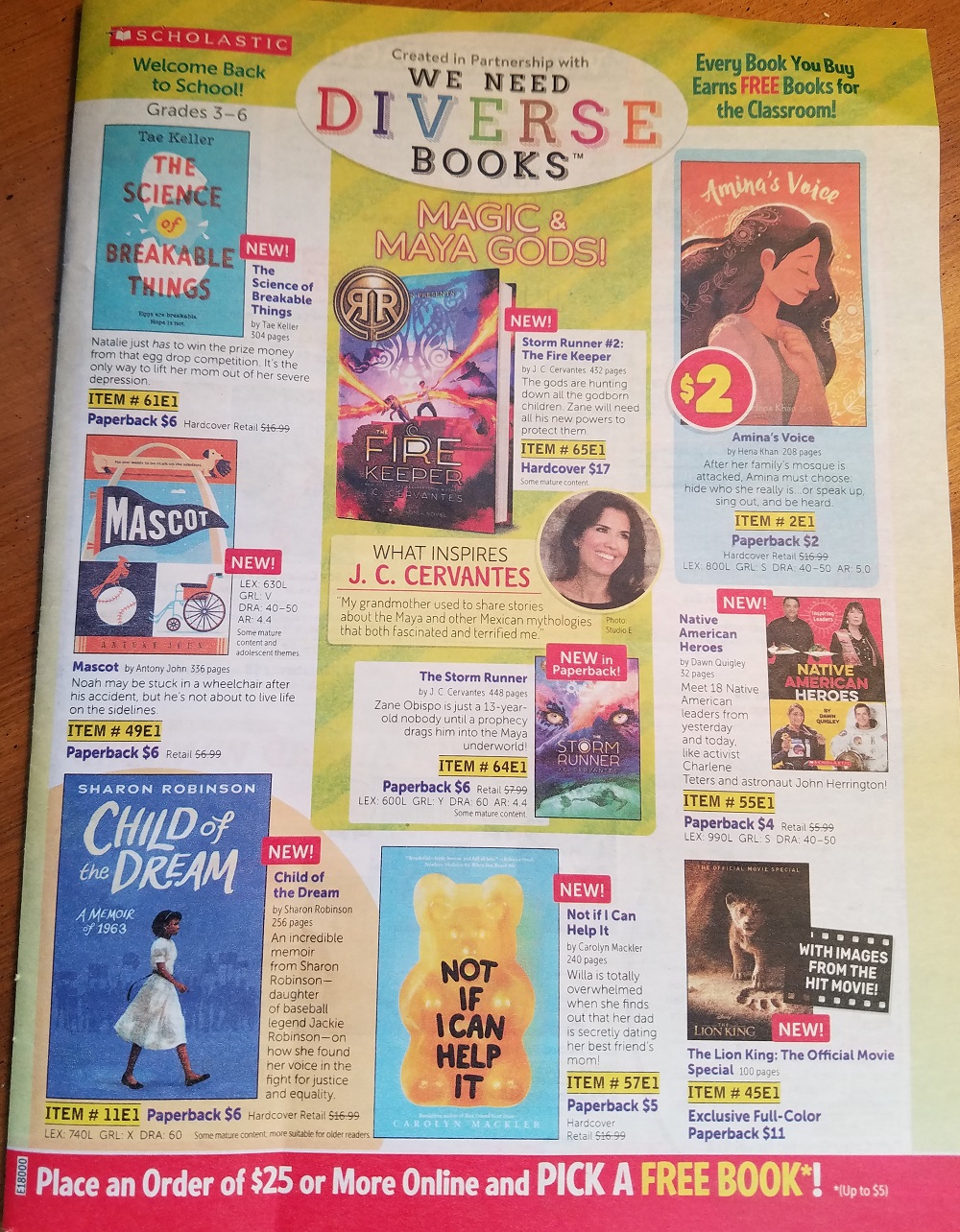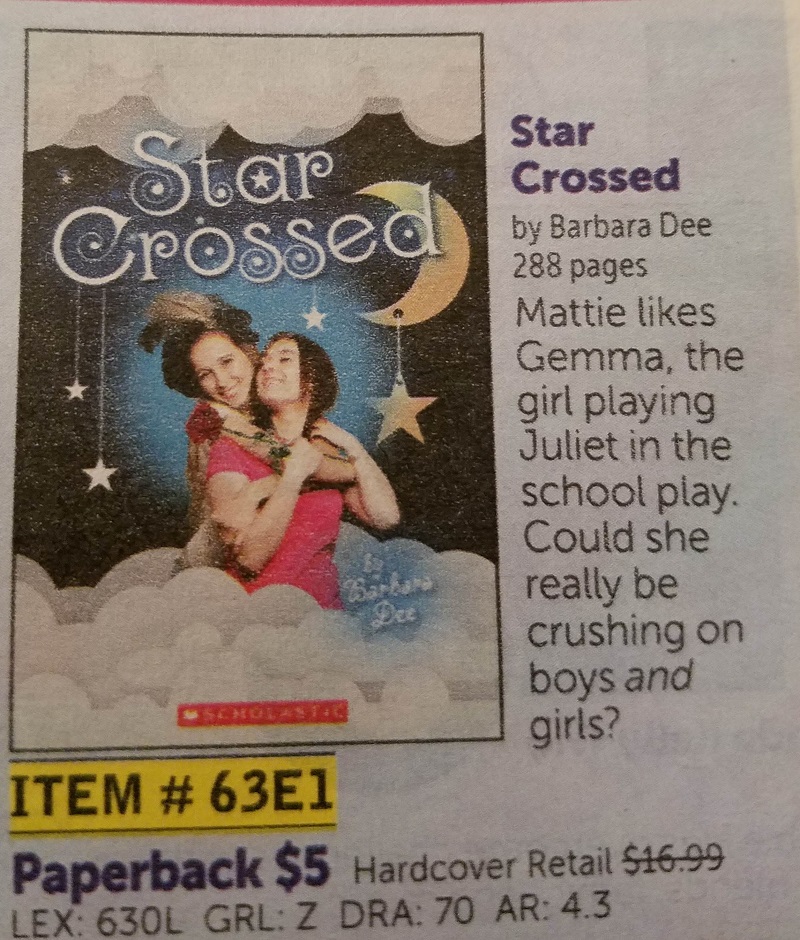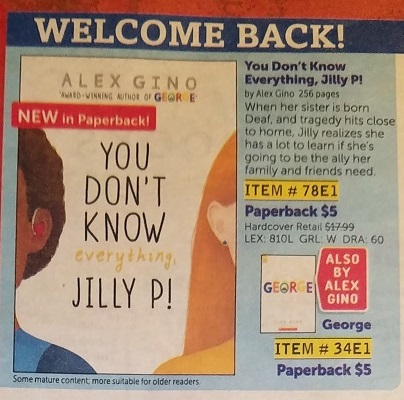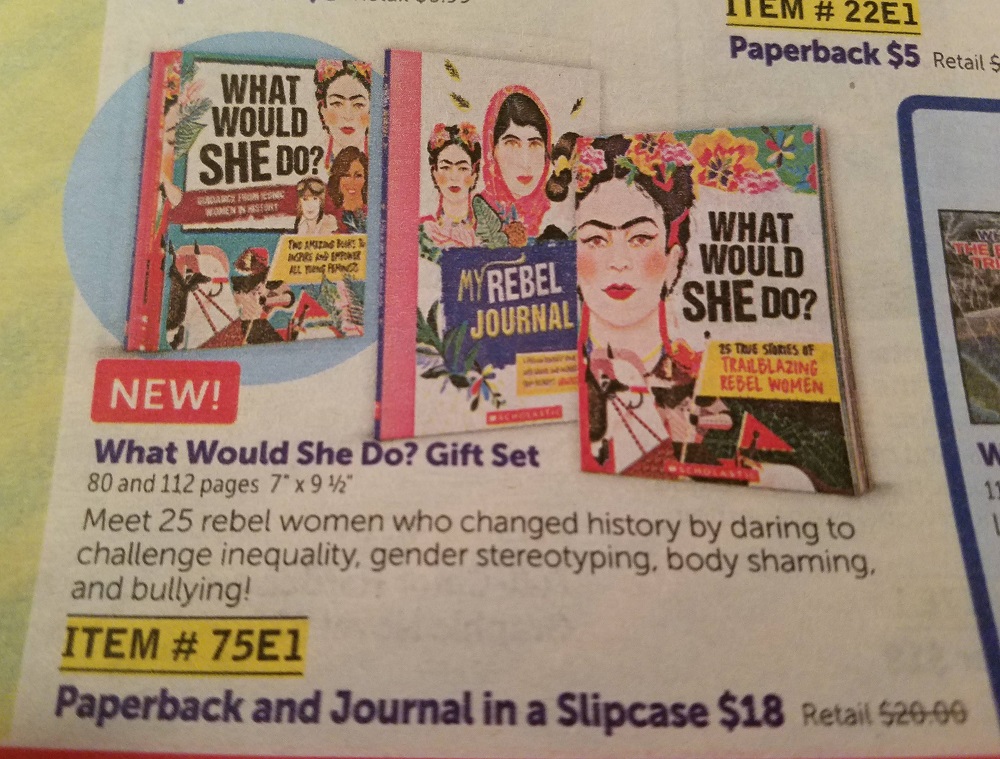Joy Pullmann:Scholastic’s New School Catalog Hawks Books To Saturate Kids With Identity Politics
https://thefederalist.com/2019/08/21/scholastics-new-school-catalog-hawks-books-to-indoctrinate-kids-with-identity-politics/
The world’s largest publisher and distributor of books to kids, which hosts the No. 1-visited site for U.S. elementary school teachers, has gone full-on woke. You won’t believe the garbage they’re selling to public schools.
This year’s back to school catalog for grades three to six from Scholastic, a children’s publishing giant, features books selected through a partnership with the identity politics pressure group We Need Diverse Books. The results are about what you might imagine.
The catalog’s front page features books about a Pakistani-American girl whose Milwaukee mosque is vandalized in a “hate crime,” a girl who finds out “her dad is secretly dating her best friend’s mom,” and a book about “Native American Heroes” who of course include political activists. Delightful. Third through sixth graders — who are approximately ages eight to twelve — definitely need this kind of broadening of their childish perspectives.

Inside, we find a novel about a middle-school girl who is cast as Romeo in the school production of “Romeo and Juliet” and finds herself attracted to the also-female lead playing Juliet. Is it possible to be bisexual in middle school, the catalog copy breathlessly asks?
There’s also a graphic novel illustrating the plight of Syria refugees, titled “Unwanted.” Inside, accompanied by depictions of mass misery and repression, author Dan Brown says that he visited several Syrian refugee camps, which “made me a more sensitive witness to the refugees’ dilemma and a more powerful advocate for their salvation.”

The catalog features a new release from author Alex Gino, who demands the pronoun “they” and whose previous book, “George,” is described this way on Amazon: “When people look at George, they think they see a boy. But she knows she’s not a boy. She knows she’s a girl.” “George” was published in Scholastic’s “Gold line, which features award-winning and beloved novels.”

Gino’s new book in the 2019 school catalog is “You Don’t Know Everything, Jilly P!” Amazon describes it this way: “Jilly has to step back to learn to be an ally, a sister, and a friend, understanding that life works in different ways for different people, and that being open to change can make you change in the best possible ways.” An Amazon reviewer gives more details about the plot of this book aimed at children who, remember, are eight to 12 years old:
Jillian prides herself on not being a bigot. She has an aunt who is black and her aunt has a partner, whom Jillian loves as well. Her Aunt Alicia, who is black has two children, Justin and Jamila, 3 and 5 respectively and Jillian just loves them. However, she has other family members such as her grandmother and her Uncle Mike, a singular buffoon who display their bigotry. The grandmother asks her daughter-in-law Alicia to bring ethnic foods such as a sweet potato pie. She also makes comments about Jamila’s hair. Many people might not catch the subtle bigotry in that, but to me and many others the subtext is quite plain…The uncle is Archie Bunker revisited, an unabashed bigot who defends his ignorant comments, even when he sees that he is driving others away. You just want to shove a drumstick down his throat.
Yes, this is definitely the sort of thing teachers of eight-year-olds should be putting on their shelves or even using during class. Right? Right up there with “Wind in the Willows” and “Huckleberry Finn.” Even better, in fact, as those were written by yucky old dead white men, and the color and sex of a person completely determines how good his or her ideas are. It’s racist to think otherwise.
Then there is the also genderbending “The Witch Boy,” by Molly Ostertag. It’s also aimed at children ages eight to 12. GoodReads summarizes its plot this way:
In thirteen-year-old Aster’s family, all the girls are raised to be witches, while boys grow up to be shapeshifters. Anyone who dares cross those lines is exiled. Unfortunately for Aster, he still hasn’t shifted . . . and he’s still fascinated by witchery, no matter how forbidden it might be.
When a mysterious danger threatens the other boys, Aster knows he can help — as a witch. It will take the encouragement of a new friend, the non-magical and non-conforming Charlie, to convince Aster to try practicing his skills. And it will require even more courage to save his family . . . and be truly himself.
I’m sure this is a message that precisely zero American children have heard, and thus so, so desperately needed. Be true to yourself, kids. Even if you have to secretly disobey your parents, who just never understand you. You will be vindicated in the end. There are no other kids’ books and movies with that basic plot, right? (J/k, that basically describes two-thirds of Disney movies.)

Even though feminism is going out of style thanks to transgenderism, there remain in the Scholastic catalog several peons to this celebratory and politics-neutral approach to life. That includes the “What Would She Do? Gift Set,” where girls can meet “25 rebel women who changed history by daring to challenge inequality, gender stereotyping, body shaming, and bullying!”
Wow, ladies, set your sights high, why don’t you. This kind of activism is absolutely of comparable social worth to dedicating your life to curing cancer, finding out how to feed masses of the world’s hungry, mothering a happy family, or serving India’s lepers. You go, girls!

This kind of stuff is not fringe in children’s book publishing. Scholastic, according to its website, is “The world’s largest publisher and distributor of children’s books with $1.6 billion in annual revenue” and the “#1 website for U.S. elementary school teachers.” There have been myriad stories of late about how politicized young adult publishing has become, but that kind of thing is by now firmly established in children’s publishing, too.
As Emily Heddleson, Scholastic’s associate director of educational marketing, told Bustle earlier this month in a feature on Scholastic’s We Need Diverse Books partner, “With the hunger for more diverse content across all areas of the market, we’ve been able to support and share new voices and stories in a way that hasn’t been possible before.”
Author Ibi Zoboi was extremely candid with Bustle about the aims of this project: “We need diverse scholars and educators who will subvert the canon, the form, and many of our hierarchical systems of selecting and lauding books.” “Subverting the canon” is literary critical theory-speak for “making sure nobody reads Shakespeare ever again, unless we decide he was really a closeted gay woman.”
The end goal of all of this is also extremely clear: fomenting the rise of identity politics among increasingly younger children, to saturate everyone’s families, schools, and public squares with far-left and hugely divisive politics.
“We Need Diverse Books has forced the children’s publishing industry to face its uncomfortable reality: that our books are predominantly white, straight, and cisgender and cater to a white, straight, cisgender readership…They’ve made some strides in children’s books and what I hope for the future is that they’ll be able to bring their influence over to the adult arena of publishing as well,” said Thao Le, a children’s and young adult book agent also featured in the Bustle compendium.
While many who support this project claim they just want to see more “people who look like them” in publishing, that’s a fig leaf for something far stronger. We Need Diverse Books was started, according to its website, by a bunch of online Twitter activists after a 2014 BookCon event dared to allow three white men on a single panel. Tell me, what’s antiracist, open, and inclusive about demanding people lose an opportunity to share ideas with others solely based on their race and sex? Or are these activists, like so many others in the world today, creating an entire movement out of projecting their racism and sexism onto people they mindlessly hate over things those people can’t change?
Well, nobody seems to care about that. The world’s biggest publisher and distributor of children’s books, like the rest of big corporate, clearly thinks it’s time to cash in on the identity politics trend. They don’t care about ideas, or about the children; they’re in this for the money.
That’s clear from a look at their offerings even if you strip out the politicized stuff — it’s a huge pile of trash. Cheap ideas, cheap writing, cheap characters, and cheap books. It’s a tragedy this company sells so many garbage books to so many schools and teachers who obviously can’t tell the difference between Geronimo Stilton and genuine children’s literature.
Comments are closed.
